
Coronation Street Fighter II
As requested by Rib Herdman

Coronation Street Fighter II
As requested by Rib Herdman
Simple SimonI just like the comment at the end. Sorry for China Spam today.
Simple Simonuh huhuhuh...huhuhuhuhuhhh
Simple SimonYikes!
Simple SimonYikes
Simple SimonI can't see the video, but I saw the pictures (on the Rapha site).
N+1 is an endless equation for how many bikes you can or should own. Ah Joo just takes it to another level.
Simple SimonThey always go to Weibo (Chinese Twitter) for commentary on these articles: Ban on farting / Ban on cooking if you have fat family...those are my favourites
Simple SimonI can't endorse churches - but this is pretty rad

In 2011, Christchurch, New Zealand was hit with a massive 6.3 magnitude earthquake. Among the city’s most heartbreaking losses was the destruction of the iconic 1864 Anglican cathedral. The city plans to have a new cathedral built, but designing and erecting a large building doesn’t just happen overnight. Shigeru Ban Architects, masters of cardboard constructions, came to the rescue with a temporary solution.

The Cardboard Cathedral is built to last up to 50 years, which should be more than enough time to get a permanent structure in place. The temporary building is made from 98 cardboard tubes and eight shipping containers, with the tubes forming the dramatic ultra-high peaked ceiling. Rather than constructing a simple emergency building to house the congregation, the architect did something extraordinary and created a temporary cathedral that actually looks like a place of worship.

Shigeru Ban wants to make it clear that, although paper is traditionally a rather weak material, this structure is one of the most earthquake-proof in Christchurch. A concrete building is easily crumbled by an earthquake, but the paper building is far less rigid. This means that it can absorb the shock of a quake without falling apart.

The cardboard tubes are coated with waterproof polyurethane and a flame retardant, so they won’t succumb to the elements. Outside of the cardboard tube ceiling, a semi-transparent polycarbonate roof adds further protection for the building and its occupants. The cathedral can hold up to 700 people, and not just for religious services; it can also be used as an event venue or concert hall.

One of the most touching parts of this project is the etched stained glass window at the entrance. The colorful glass triangles show pictures from the destroyed church’s facade, ensuring that part of that beloved landmark lives on.




Simple SimonThis is Parks and Recreation. Alan, I'm sure I've seen you like that in the office before...

Thanks to @palmerleggings!

Thanks to @palmerleggings!

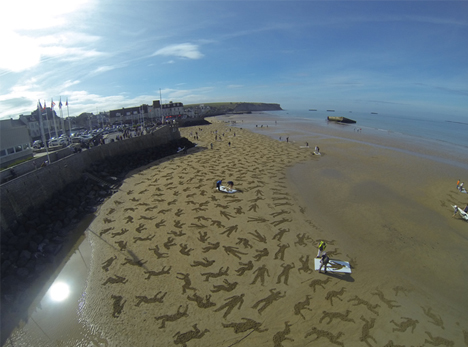
To commemorate those fallen on D-Day in France – civilians, Axis and Allies alike – a pair of sand artists used stencils and solicited volunteers to create a highly temporary art installation, destined and designed to be washed away by the incoming tide.
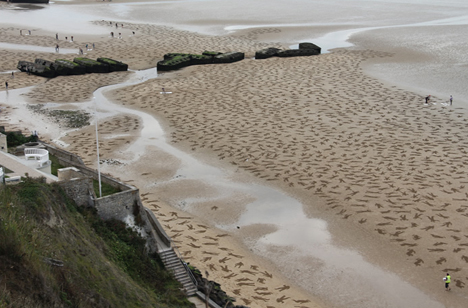
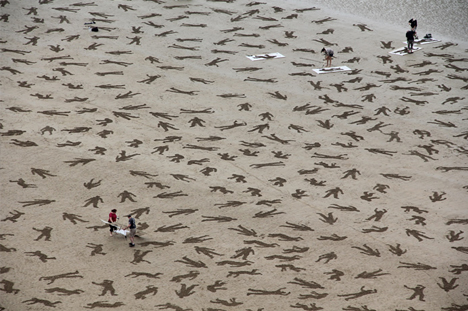
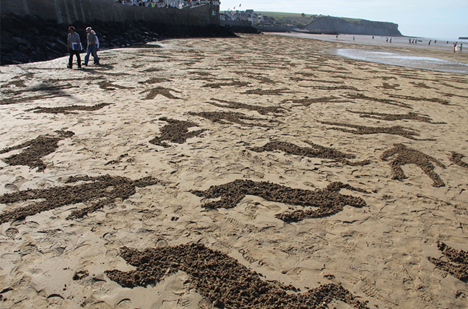
On September 21st, the pair and their helpers, given stencils and quick instructions, had to work quickly to make The Fallen a reality. At one point, it looked like they would not have even assistance to finish before the water came in to erase their creation.
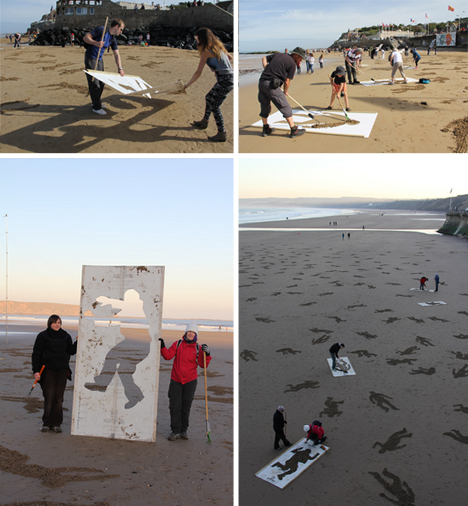
Thankfully, hundreds of additional people turned out on top of the dozens who had agreed to help … together these, “people took stencils and rakes in hand and embarked on drawing the 9000. The Peace Day project had finally begun in earnest represented by the people of the world.”
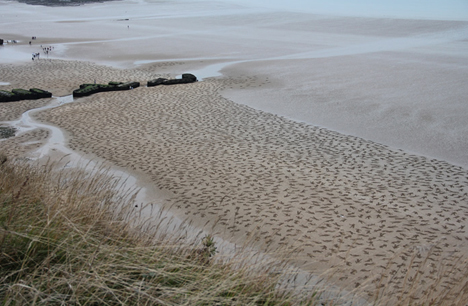
Jamie Wardley and Andy Moss (images by Sandinyoureye) developed the idea of The Fallen as a project for Peace Day well in advance. They created stencils in preparation, but were surprised by the people who turned up from around the world (drawn together, as it were) to commemorate those lost in World War II and otherwise.
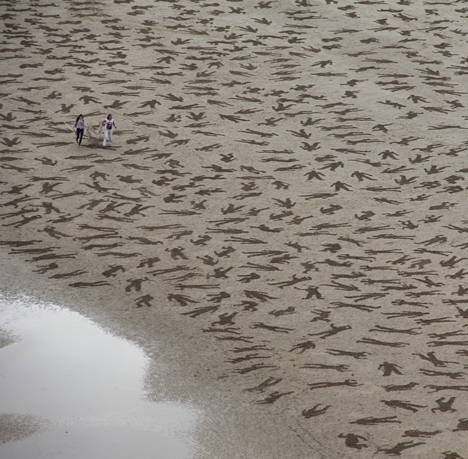
Among those participants in attendance, “Monika Kershaw was there remembering her son and his colleagues that died in Afganastan and even wrote in their names beside them. George, a veteran who was on the D-Day beaches was also there and embraced the importance of the project as demonstrating the result of conflict. There were a group from Israel that drew together, people from Germany, Finland and as far as Chili.”




Simple SimonBargain, but pretty ace views.

At the top of a former cardboard box factory built in 1915, within a clock tower overlooking Brooklyn and Manhattan, is one of New York City’s most remarkable residences. The pinnacle of the Clocktower Building is a three-story penthouse measuring over 6,800 feet, with four 14-foot glass clocks – one on every wall of the top floor.


The clocks offer massive, unparalleled views of the city in all directions. Additional windows provide a look at the Manhattan Bridge to the Statue of Liberty from a soaking tub. Or, simply go on the sky roof cabana and enjoy it in the open air.


Transformed from its industrial past, the penthouse features a ceiling that extends from 16 to 50 feet in height, as well as a glass-enclosed, three-story elevator running up the center of the space. It entered the market in 2009 for $25 million – the most expensive apartment on record in Brooklyn by far – and has now been lowered to $18 million.


For a while, as it went unsold, the clock tower penthouse was put up for rent for a mere $50,000 per month. It’s also been offered up for various special events while it sits on the market, including a dinner for Esquire Magazine.




Simple SimonThis is a nice site - naturally, the Bike section, and the People I don't much care for section.

… at least as far as I’m concerned. If you’re like me, then you’ve probably seen the work from the UK artist before. After a reader forwarded me Dawn Painter’s portfolio site, I spent a good amount of time poking around at the various illustrations. Naturally, the Campy jersey and bidon were my favorite but there’s too much good stuff in there to not share.
Do yourself a favor and check out Dawn Painter’s site!
Simple SimonThese dudes have a KFC on every freakin corner here. I hate how cheap their food is.
Simple SimonFishes day out (photo #2)
Simple SimonA sparse part of the world that I'm still quite attached to
Artifacts is a series about physical items that have meaning to photographers in the field. The items are styled, shot, and described by the photographers themselves.
After studying photojournalism at the University of Missouri, Columbia, Ikuru Kuwajima lived and photographed in several postcommunist states, including Romania, Ukraine, Kyrgyzstan, Kazakhstan, and Russia. For the past three years, Kuwajima has traveled and covered Central Asia extensively and continues to photograph in the post-Soviet states. He’s currently based in Kazan, Russia, and is working on documentary projects around the region.
“These are things that I have collected and kept despite moving a number of times in the past six years. I don’t know exactly why I keep them—except, of course, the passport, panoramic camera, and the cigarettes, which are the most essential belongings for me.”—Ikuru Kuwajima
1. Fuji TX-1. This panoramic camera is the one I often carry to shoot for myself.
2. One Tajikistan bill. It’s about $0.20.
3. Japanese ear pick. I can’t find Japanese ones here, so I keep this. You can get chopsticks everywhere, but not ear picks.
4. Japanese mother-and-baby notebook provided by the city of Kyoto. I keep a bunch of old documents just in case.
5. DVD of Russian popular serial Interny. Someone in Kazakhstan gave this to me. I’ve never watched it. Sometimes you end up keeping stuff that is not so important for reasons you don’t know …
6. Pouch and coins. The metro tokens are from Kiev and St. Petersburg. The coins are: a rare old one from Kazakhstan, a Swiss one, and a Tunisian one that someone gave to me in exchange for a Japanese coin. The pouch was a gift from a passenger on Air Astana. I use it as a wallet or passport case.
7. Hermann Hesse postcard. I got this at a museum near Lugano, Switzerland. Hesse was one of my favorite authors as a teenager.
8. SIM cards from Eastern Europe and Central Asia. I store them in SD card or lens filter cases.
9. Psoy Korolenko album called Ruskoe Bogastvo Volume II (Russian Treasure, or Russian Wealth, Volume II).
10. Two magnets from Almaty, Kazakhstan. Sometimes I buy too many souvenirs, so some of them become my own.
11. German tablets that work well for hangovers.
12. Cigarettes called Russian Style. These are cheaper than Kent and better than Winston, I think. (They cost about $2.)
13. A roll of Kodak Film ISO 200. I’ve never used this but I carry it around. This must have been x-rayed a lot.
14. An old German camera that was modified by a photographer in Kazakhstan.
15. A Japanese talisman. This is called omamori in Japanese and it’s supposed to keep you out of trouble. I’m not superstitious but my mother gave it to me so I have to keep it. I got into trouble a lot anyway, but maybe it helped keep me out of the worst times.
16. Bukhara Jewish cap. When I was in the synagogue in Bukhara, this cap reminded me of a friend. So I bought him one as a souvenir. I don’t get out of Eastern Europe/Central Asia much and shipping is expensive and unreliable. So I still keep it.
17. Ricoh GR1v that I bought in Japan for a photographer friend but which he sold back to me later.
18. Three mini-books of Lenin, Basho, and Pushikin that I carry sometimes but hardly read.
19. Expired Romanian presscard and a Lenin pin
20. Orthodox icon
Ikuru’s Work



Find more of Ikuru Kuwajima’s work on his website.
Follow Kate LaRue and Jody Sugrue on Instagram.
Simple SimonWell nice
Leaving his trusty Nikon behind, Jim Richardson returns to a favorite spot to photograph, the Scottish Highlands, with a brave new tool—the iPhone 5S.
Our hike across Scotland continues. Edinburgh then up to Oban on the west coast, around the wee Isle of Kerrera, over by ferry to Mull, Iona, and Staffa, the island of black basalt columns, and then to Ben Nevis, Scotland’s highest mountain.
It started out a little rough—maybe I wouldn’t get out of the corner I’d painted myself into.
That first day in Edinburgh had me worried. True enough, the new iPhone I had decided to use was delightfully light to carry as we scrambled up Arthur’s Seat to look down on the capital city of Scotland. But I’d be lying if I said I wasn’t struggling to make pictures. Walking down the Royal Mile surrounded by all things Scottish, nothing seemed worth a picture. Out of desperation I took a few glib shots. Awful! Surrounded by great subjects I could see nothing. Made me feel worse.
New cameras are supposed to unlock photographic possibilities. New vistas are supposed to open up before us, the images flowing like water, creation itself swirling all around us. Then reality sets in.
We slogged our way up the volcanic crag called Arthur’s Seat, where the happy crowd did endless selfies with their friends. I got a couple of pictures, not much really. Hiking back down, I was a bit befuddled. And then we detoured to admire the swans in St. Margaret’s Loch, which posed and postured gracefully, gliding up close, easy subjects devoid of angst, however hackneyed they may be. They made pretty pictures. The iPhone liked them.
Cameras all have personalities. Or perhaps they have visual signatures. To some extent they always lead us around by the nose. Little by little we come around to taking the pictures the camera can do well.
With intense use (I’ve made about 4,000 pictures in the last four days) I’ve discovered that the iPhone 5S is a very capable camera. The color and exposures are amazingly good, the HDR exposure feature does a stunningly good job in touch situations, the panorama feature is nothing short of amazing—seeing a panorama sweeping across the screen in real time is just intoxicating. Best of all it shoots square pictures natively, a real plus for me since I wanted to shoot for Instagram posting.
Once I figured out what the camera could do well I began to forget all the things it couldn’t do at all. Hiking up to Ben A’an, a popular Sunday hike for hearty Scottish families, I found that it was really quite capable of doing nice macro shots of mushrooms in the woods. And up on top, overlooking Loch Katrine, the scenes of the children perched on the bobby peak were ready-made for simple, unfussy images.
By the time we got to the Isles of Staffa and Iona I was fully entrenched in quick, facile seeing. I played with the patterns of volcanic basalt columns in Fingal’s Cave, played with portraits of medieval knights carved in their grave slabs at Iona Abbey—even in low light in the museum the camera did pretty well. We didn’t have much time but that was OK because being quick and nimble was really quite fun.
What surprised me most was that the pictures did not look like compromises. They didn’t look like I was having to settle for second best because it was a mobile phone. They just looked good. Nothing visually profound is being produced here, I would have to say. But it feels good, and I even noticed some of the folks on our tour putting big digital cameras aside once in a while and pulling out their cell phones when they just wanted to make a nice picture.
We still have days to go here in Scotland. We are out on the Isle of Skye tonight and tomorrow it is going to rain—this is Scotland, after all. Almost all cameras can take good pictures in good situations. We’ll see how I do when the going gets tough.
Follow Jim’s visual voyage on Instagram at #proofscotland. A full collection of Jim’s photo tips can be found here.
Jim Richardson is a Kansas farm kid whose father loaned him a used camera and whose mother allowed him to use her kitchen as a printing darkroom. He has been photographing his rapidly expanding world ever since, often seeking out remote places and always searching for the extraordinary in the commonplace. One of his favorite locations is Scotland.
Simple SimonYep, been there.

Thanks to Ali!

Thanks to @findlaymarks!
Simple SimonThis guy is a bit of a hero on Parks and Recreation.

Thanks to @findlaymarks!
Simple SimonThis could be me in Bergen!

Junior - New York - 2010
Simple SimonThese are impressive, it's difficult to master photographing cars like that!
This guest post is by Armin H. Ausejo (websites: arminausejo.com | arminweddings.com | Twitter | Facebook, click on images for larger view):
Motorsports, in some form or another, has been around for more than a century, and of course documenting motorsports through photography has been around for just as long. While motorsports generally involves competing to be the fastest from Point A to Point B, one form of motorsports known as “drifting” involves style and precision, rather than outright speed and lap times. Originating on the twisty mountain roads of Japan in the 1980s, purists may not regard this as a proper form of motorsports, but it’s definitely among the most exciting to watch and photograph.
I’ve been shooting drifting since 2006, and over the years I’ve used a variety of different Nikon bodies: D200, D300, D700, and D4. When I first started shooting motorsports, I was one of only a handful of Nikon shooters amongst a sea of white lenses, but as the years have gone by, I’ve been seeing more and more Nikon shooters out on track with me. Unlike most other motorsports, drifting is very dynamic by nature and as a photographer, my goal isn’t simply capturing a frozen moment in time, but also the passage of time, the motion of the cars, and even the tire smoke itself.
It’s very important to capture context with the subject, so simply setting your camera to a fast shutter speed and zooming in as close as possible often doesn’t deliver the best results. Drifting isn’t just about the car(s) as the subject: there’s the look on the driver’s faces, the crowd roaring behind them, the smoke billowing from the rear tires, and sometimes even the other media along side you on track. One of the ways I try to capture all of these nuances is by switching between telephoto and wide angle lenses. My Nikkor 70-200mm f/2.8G VR2 is definitely my go-to lens for motorsports, but I’ll also switch to my Nikkor 24-70mm f/2.8G and get some wide shots.
I also have a Tokina 17mm f/3.5 that I’ll use when I went to get really wide, providing a perspective that really pops out at the viewer, albeit often a little distorted. It can often be a little hair-raising to use this lens on track, since you really have to get up close and personal with a car flying past you in very close proximity.
Using different lenses, focal lengths, and angles is important for drift photography, but the one thing that you absolutely can’t live without when shooting drifting is the ability to pan with the subject. Panning isn’t easy; it takes a lot of practice, patience, and willingness to throw away a lot of photos. I typically advise first-time track shooters to start at a relatively fast shutter speed, anywhere between 1/125 sec and 1/200 sec. You don’t want to set the shutter too fast; otherwise you’ll stop the motion of the wheels, making the car look like it’s simply just parked on the track. You also don’t want to set the shutter too slow to start, since you’ll have a hard time judging if you’re getting your panning fundamentals in place.
I also advise to set the camera to continuous focus and burst fire mode, with the autofocus point where you’d want the front bumper of the car to be in your frame. Sure, you might be able to get away with just taking one or two shots and manual focusing, but when you first start out, it’s much easier to go this route until you get more panning shots under your belt. As you improve with practice, you’ll start to notice that you’ll have more and more sharp “keeper” photos, and fewer photos that are just simply out of focus. Once you reach this point, it’s time to start slowing down the shutter speed and seeing if you can continue to get sharp keeper photos. For me personally, I’m able to get consistent sharp photos at 1/30 sec, but I also sometimes shoot as slow as 1/10 sec to achieve some really nice results.
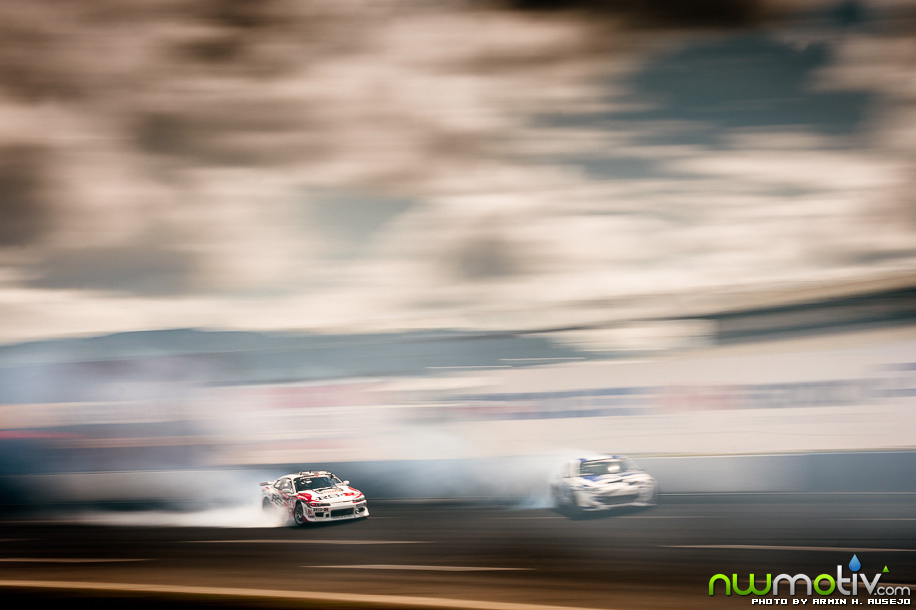
Ken Gushi vs. Toshiki Yoshioka, Nikon D700, Nikkor 70-200mm f/2.8G VR2, 70mm, 1/10 sec, f/13, ISO 200
To help achieve these long shutter speeds, you’ll more than likely need an ND filter, and for all automotive photography, a circular polarizer is absolutely essential. Each of these photos was taken with a B+W or Nikon drop-in circular polarizer, along with a B+W 3-stop ND filter or ND film when necessary. Either way, panning is all about practice, practice, and more practice.
Shooting drifting is very easy to get into, since many of the major racetracks around the country have “open drifts,” allowing locals to just get on track with their cars and learn how to slide their cars sideways around the track. Just be sure to keep it on the track; I definitely do not condone doing this sort of thing on public roads. I hope you enjoyed this guest post and please feel free to contact me if you have any questions or need some advice.
Armin H. Ausejo
Senior Editor, NWMotiv.com
Portfolio: ArminAusejo.com
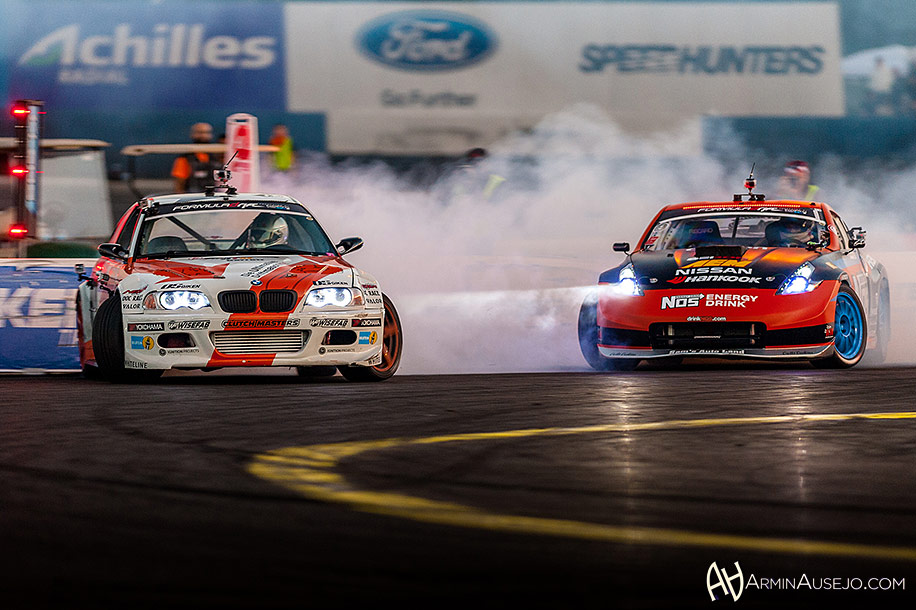
Mike Essa vs. Chris Forsberg, Nikon D700, Nikkor 300mm f/2.8G VR2, 300mm, 1/160 sec, f/2.8, ISO 1250
If you have an interesting idea for a guest post, you can contact me here.
Posted by NikonRumors.com
This RSS feed is copyrighted and cannot be republished in any way without permission.
Follow [NR] on Facebook and Twitter.

Related posts:
Simple SimonFlight of the Conchords...Need to get back on that jam

Thanks to Lily!
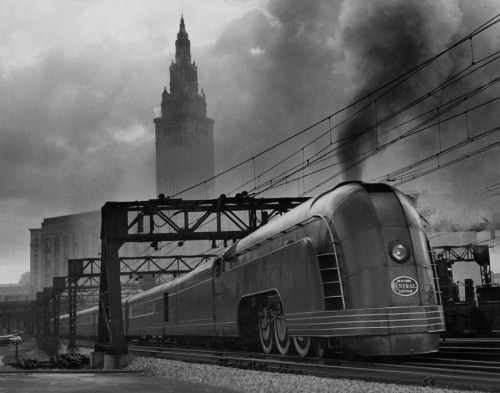
A New York Central Mercury train is dwarfed by Cleveland’s Union Station, November 1936.Photograph by J. Baylor Roberts, National Geographic
Simple SimonDo cat videos ever get old?
Yesterday The Telegraph spoke to 10 cats about their thoughts on Ed Miliband’s speech at the Labour party conference.
Today, we speak to 11 cats about their thoughts on the other cats’ thoughts.

Meredith, 4 “The Telegraph did a cat opinion piece? Now this I must see.”

John, 8 "I think it’s a great way to make politics more accessible to those who find it hard to understand… and cats."

Claudia, 7 "Not cool, Telegraph. Only BuzzFeed are allowed to personify cats in this manner."
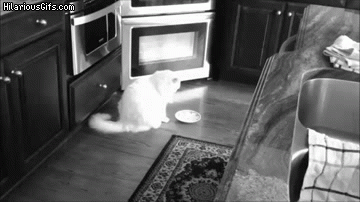
Tom, 3 “Is this really an appropriate article for a publication that is introducing a subscription-based model?”

Jenny, 11 “You humans’ obsession with cats has left me in a state of ennui.”

Henry, 9 "Is this what counts as ‘news’ now? This country is going to the dogs!"

Lucy, 8 months “I pay close attention to politics, why shouldn’t our opinion be heard?”

Dan, 13 “Sure, they represent the major parties like Labour. But what about the little guy? What about the Monster Raving Looney Party?”

Jamal, 4 “I like the Internet”

Tina, 4 months “Miaow. I like tummy tickles.”

Grumpy Cat, 1 “NO.”